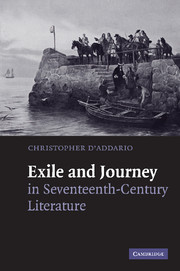Book contents
- Frontmatter
- Contents
- Acknowledgments
- Introduction: The “remanence” of the past: the early modern text in exile
- 1 Nostalgia and nationalism in New England literature
- 2 Exile and the semantic education of Thomas Hobbes's Leviathan
- 3 The expulsion from Paradise: Milton, epic and the restoration exiles
- 4 Sybil's leaves: Dryden and the historiography of exile
- Epilogue
- Notes
- Index
4 - Sybil's leaves: Dryden and the historiography of exile
Published online by Cambridge University Press: 22 September 2009
- Frontmatter
- Contents
- Acknowledgments
- Introduction: The “remanence” of the past: the early modern text in exile
- 1 Nostalgia and nationalism in New England literature
- 2 Exile and the semantic education of Thomas Hobbes's Leviathan
- 3 The expulsion from Paradise: Milton, epic and the restoration exiles
- 4 Sybil's leaves: Dryden and the historiography of exile
- Epilogue
- Notes
- Index
Summary
In the closing years of the seventeenth century, a number of “Miltons” circulated through the bookstalls of London, from Jacob Tonson's ornate 1688 edition of Paradise Lost, complete with its own set of plates and a dedication from John Dryden, to the reprint of Eikonoklastes (1690), Milton's vehement, anti-monarchical attack on Charles I's Eikon Basilike. At the end of a century marked by conflict, the London print world seemed intent on reevaluating the work of a man who had been at the center of that conflict, and who, in its aftermath, had turned from prose polemic to epic poetry. The various afterlives of Milton in the years immediately following his death tell one of the more remarkable and complex stories of authorial revaluation in the early modern period; remarkable for the profound transformation of Milton from radical republican polemicist to the author of England's great epic poem, a transformation enacted most prominently in Tonson's lavish reprint; complex because, alongside this transformation of Milton into an English “classic,” came the reprint of Eikonoklastes, Whig plagiarisms of this and other of Milton's political pamphlets, and, most substantially, a collected edition of Milton's Historical and Political Works, printed in 1699 and accompanied by John Toland's partisan Life of Milton. This second group of books unmistakably enlisted our deceased author as the primary spokesman for an anti-monarchic, oppositional Whig agenda.
- Type
- Chapter
- Information
- Exile and Journey in Seventeenth-Century Literature , pp. 124 - 148Publisher: Cambridge University PressPrint publication year: 2007



